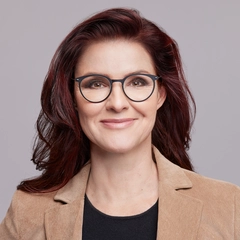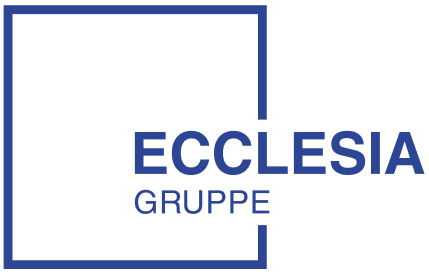Konstanze Marinoff, Member of the Management Board and Chief People & Culture Officer at Sana Kliniken AG, talks about the challenges and opportunities of a comprehensive HR transformation. Using the example of her group of companies, she explains how data-based decisions, team spirit and humanity work together and why humour is sometimes the best change manager.

Success story: How Sana combines digital transformation, securing skilled labour and cultural change
Konstanze Marinoff, Member of the Management Board and Chief People & Culture Officer at Sana Kliniken AG, talks about the challenges and opportunities of a comprehensive HR transformation. Using the example of her group of companies, she explains how data-based decisions, team spirit and humanity work together and why humour is sometimes the best change manager.
Konstanze Marinoff will be a live keynote speaker at the 17th Hospital Personnel Congress on 1 and 2 December in Cologne . Organised by Klinikrente (Ecclesia Group) and in cooperation with the German Hospital Association, the congress has long since established itself as a fixed industry meeting point for management and HR managers in hospitals, rehabilitation and care facilities. The successful motto: "Networking - Knowledge - Thinking ahead". See below for more information.
Ms Marinoff, how can healthcare facilities better motivate, promote and retain their employees - and attract new specialists at the same time?
Konstanze Marinoff: That is a very exciting question. I think the needs of employees are similar across all sectors. Authentic recruiting is important - without false promises. Applicants should feel that they are being taken seriously and understand what the company is all about.
The working environment is crucial for retention: Do employees feel comfortable in the team? Do they have managers who encourage and challenge them? Do they have work content that they identify with? It is particularly important that they feel part of a team in which they would like to remain.
What particular challenges do you see in the healthcare sector - such as shift work or weekend shifts?
Konstanze Marinoff : Anyone who chooses a career in the healthcare sector usually knows that shift work is part of it. That's not the main problem. Much more important is the ability to plan: reliable duty rosters and knowing for sure when a day off is coming up are crucial. The healthcare sector is special because it involves working with people - that can't simply be put off until tomorrow. This responsibility sets the sector apart from others.
What do you think is needed at a political level to strengthen the healthcare sector in the long term?
Konstanze Marinoff: Sometimes it needs less, not more. The industry is heavily regulated, which is basically a protective measure. However, too many reporting obligations and rigid requirements can hinder the important work of caring for people. If doctors and nursing staff spend more time on documentation than with patients, something is wrong. More flexibility and entrepreneurial room for manoeuvre are needed so that staff can be deployed where they are needed.
Would it be helpful if political decision-makers were to visit a facility to gain a better understanding of everyday life?
Konstanze Marinoff: Absolutely. Anyone who really knows the everyday life of a doctor or carer will also have a better understanding of which measures make sense. Not every requirement meets the needs of employees. Some would also like to take on extra shifts voluntarily - that should be possible if it is fairly remunerated.

– Konstanze Marinoff (Member of the Management Board and Chief People & Culture Officer at Sana Kliniken AG)Transformation can only succeed if you take people with you. We focus on diversity in the project teams - different levels, professional groups and cognitive diversity. This is the only way to create solutions that really work.
Can you please give some concrete examples of how Sana positions itself as an attractive employer - for retaining and attracting new employees?
Konstanze Marinoff : As part of a group, our Sana companies benefit from a certain degree of security - a great advantage, especially in times of change. Nevertheless, employees do not opt for a group, but for the local team. What makes Sana special is its tangible humanity, regardless of location. Whether on the island of Rügen, in Hamburg or Hoyerswerda: the corporate culture is characterised by team spirit and respectful cooperation. These values help us to inspire new employees and retain existing ones in the long term. However, the management on site is always decisive: how the team functions, how respectful the interaction is.
Is there positive feedback from employees that confirms this corporate culture?
Konstanze Marinoff: Yes, definitely. When we developed a shared cultural mission statement, the feedback was very positive. Many employees emphasised how strongly they identify with Sana. There are numerous examples of colleagues who have spent their entire working life at Sana, some were even born in the hospital, completed their training there and retired there. This emotional bond is something special.
You are currently undergoing a comprehensive HR transformation. What characterises this project and how far has it progressed?
Konstanze Marinoff : The process is still ongoing and will continue to accompany us beyond this year. Our focus is on digitalising all HR processes in order to reduce the administrative burden and create more space for value-adding HR work. The aim is for HR to actively support employees through changes together with managers instead of getting lost in day-to-day business with certificates and recurring tasks. We want to be able to make data-based decisions on which measures make sense for employee retention. This requires a standardised and reliable digital database.
– Konstanze Marinoff (Member of the Management Board and Chief People & Culture Officer at Sana Kliniken AG)We don't just want to manage, we want to shape." Our HR work should be strategic, forward-looking and based on partnership - not just administrative. We create space for this through digitalisation and a new understanding of roles.
Were there any particular challenges or positive surprises during the transformation process?
Konstanze Marinoff:A project of this size is never easy. The biggest challenge was and is to get everyone on board. All the more gratifying is the commitment of many teams, including those outside the company headquarters, who are bringing the whole project to life.
How does the HR transformation affect a company as large and diverse as Sana?
Konstanze Marinoff: The transformation affects everyone - from doctors to cleaners, important interfaces such as IT and Finance, all managers and especially the entire HR team. With over 40,000 employees and more than 150 companies, the change is tangible. Our participative approach with interdisciplinary project teams and continuous involvement of the works council was particularly helpful, as it enabled sustainable decisions to be made.
What role does the size of Sana play?
Konstanze Marinoff: The size and diversity of Sana, with large clinics, small MVZs (medical care centres) and specialised service providers, brings with it different requirements and needs. This makes the transformation challenging, but particularly exciting. It is precisely this diversity that opens up the opportunity to develop the best possible solutions for everyone and to learn from each other. It strengthens our ability to act flexibly and with an eye to the future. We take concerns seriously, explain changes and provide active support. HR takes on a central role as a shaper and reliable partner. This is challenging because we have to transform and remain present for employees and managers at the same time.
How can you create the space for such a project during ongoing operations?
Konstanze Marinoff: That is one of the biggest challenges. We have tried to build up additional capacity, for example through external consulting or by releasing employees from operational duties.
But to be honest, it's never enough. It takes a lot of commitment, many extra miles. It is important that we do not reduce the resources freed up by the transformation and process optimisation, but instead invest them in future-oriented HR work - in important functions such as recruiting, personnel development, talent management and change support.
How do you manage to integrate training and change support into everyday life without overburdening employees?
Konstanze Marinoff: It's a balancing act. We rely on well-dosed training, consultation hours, empowerment concepts and good guidelines for self-help. And sometimes we simply need space to support each other, take a deep breath and reassure ourselves:We can do this together.
If everyone understands what the target image is - and that they are part of it - then the journey becomes easier.

– Konstanze Marinoff (Member of the Management Board and Chief People & Culture Officer at Sana Kliniken AG)Pension provision is a topic that concerns many - especially in uncertain times. The partnership with Klinikrente gives our employees security. That is a real competitive advantage.
What role do digital tools play in the transformation - and what are the opportunities and challenges?
Konstanze Marinoff:Digital tools are a key driver of our transformation. New technologies such as AI or skill-matching tools are developing rapidly - this can raise questions, but above all it offers great opportunities. We want to use these solutions in a targeted and supportive way to create capacity for the really important tasks. This requires confidence in their use, clear training and a good understanding of the possibilities and limitations. This creates new, exciting tasks, particularly in the HR department, and makes the role of HR even more important.
Sana has been a partner of Klinikrente since 2002. What role does this collaboration play in the context of HR transformation?
Konstanze Marinoff: The partnership with Klinikrente is an important component of our attractiveness as an employer. Pension provision is a key issue, especially at a time when security and reliability are particularly important. Our strong and stable partner gives us a real competitive advantage. We are very satisfied with our collaboration.
What are the specific benefits of data-based HR work - and how can concrete measures be derived from it?
Konstanze Marinoff:Data enables us to take a targeted look and make well-founded decisions. For example, if we notice that staff turnover on ward 2B is higher than on ward 1A, we can analyse the causes, such as management behaviour, age structure or workload. Data is also helpful for strategic personnel planning: if many employees in one area are about to retire, we can take countermeasures in good time with training or targeted personnel development. It is not about evaluating individual absences, but recognising patterns that point to structural issues. At the same time, we use data to visualise career paths, for example by providing information on mobility, further training or development potential. This allows us to provide targeted support internally instead of looking externally.
What does strategic skills management look like at Sana - and how do you manage the complexity of further training requirements, for example in the medical field?
Konstanze Marinoff:We can plan ahead for the future: Where will fewer administrative tasks be needed in the future? Where will the need for certain qualifications increase? When a position becomes vacant, we not only consider how we will fill it, but with which profile. This is strategic HR work. Training planning is particularly complex in the medical field. This requires an integrated HR system that intelligently links master data, recruiting, duty planning and qualifications. This allows managers to see at a glance who is available and when, which training courses are coming up or which requests employees have made. The aim is for systems to provide support so that people can concentrate on the essentials.
How will you recognise that the HR transformation has been successful - and how do you personally motivate yourself along the way?
Konstanze Marinoff: For us, success means that the administrative workload has been noticeably reduced, all HR processes have been digitalised and decisions can be made based on data. When managers use dashboards to recognise where action is needed and develop suitable measures together with HR, we have achieved a lot. And if the HR team sees itself as a true partner to managers and is perceived as such, that's a big step. Personally, I am motivated by the trust and energy of my team, especially in challenging phases. When we can laugh together, even when things get difficult, then I know that we are on the right track.
Sana Kliniken AG: A strong group in transition
With around 41,000 employees and over 150 companies, Sana Kliniken AG is one of the leading integrated healthcare providers in the German-speaking world. Its holistic healthcare services for four million patients each year range from preventive care, outpatient and inpatient care to aftercare, rehabilitation and the provision of remedies and aids. In addition, Sana also offers B2B services and consulting for external clinics, including in the areas of purchasing, logistics, medical technology and management contracts. The decentralised structure is both a challenge and a strength: it enables proximity to people and at the same time the use of Group-wide synergies. In the midst of this complex structure, Sana is driving forward a far-reaching HR transformation with the aim of rethinking HR management.
Personnel congress of the hospitals
Konstanze Marinoff will be a live keynote speaker at the 17th Hospital Personnel Congress on 1 and 2 December in Cologne. Organised by Klinikrente (Ecclesia Group) and in cooperation with the German Hospital Association, the congress has long since established itself as a fixed industry meeting point for management and HR managers in hospitals, rehabilitation and care facilities. The successful motto: "Networking - Knowledge - Thinking ahead". In terms of content, the aim is to develop new approaches and solutions together. The focus is on exchange, inspiration and practical impulses relating to the challenges and future topics of HR management in the healthcare industry. Participants can expect a varied programme with top speakers, exciting best-practice examples and plenty of room for intensive networking - also in personal discussions at the sponsor tables. The venue - in the stylish ambience of - is the Wolkenburg event location. Take the opportunity to be part of this important industry event and secure your place now!
